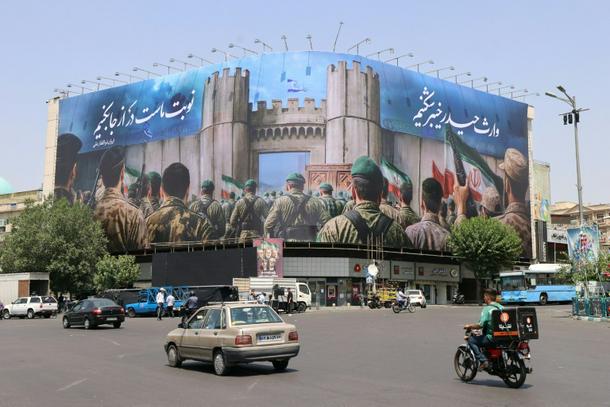
An anti-Israel poster in Tehran's Enghlab Square
Jerusalem (AFP) - Israel targeted Iran’s air defence capabilities on Saturday, pressing on with a massive wave of strikes it began a day earlier that targeted Iranian nuclear and military facilities, prompting counterattacks by Iran.
Israeli Prime Minister Benjamin Netanyahu vowed to hit “every target of the ayatollah regime”, adding: “What they have felt so far is nothing.”
Iranian President Masoud Pezeshkian, meanwhile, warned the continued “aggression will be met with a more severe and powerful response”.
The first wave of Israeli strikes killed 78 people and wounded 320, according to Iran’s ambassador to the United Nations.
The Israeli military said three people were killed and 76 wounded since Iran began its retaliatory attacks.
International calls for restraint have multiplied as fears grow that the Middle East could be on the threshold of a broader conflict.
Here is what we know:
- Targeting air defences -
On Saturday, Israel’s military said it was attacking dozens of missile launchers in Iran after announcing it had targeted air defences with a wave of strikes in the Tehran area.
Iranian media also reported a “massive explosion” on Saturday after an Israeli drone strike on a refinery in the southern city of Kangan.
The air campaign, which has targeted surface-to-surface and surface-to-air missile infrastructure in Iran, has given Israel “aerial freedom of action from west Iran all the way to Tehran”, Israeli military spokesman Effie Defrin told journalists.
Defence Minister Israel Katz warned that “Tehran will burn” if Iran kept targeting Israeli civilians.
- Iran’s response -
Israel said dozens of missiles – some of which were intercepted – had been fired in the latest salvos from Iran.
AFP images of the city of Ramat Gan near Tel Aviv showed blown-out buildings, destroyed vehicles and streets strewn with debris.
Iran’s Revolutionary Guards said they had attacked dozens of targets in Israel.
- Nuclear talks -
The fiercest ever exchange of fire between the arch foes came amid ongoing talks between Tehran and Washington seeking to reach a deal on Iran’s nuclear programme.
Before the Israeli strikes, the two sides had been set to hold a sixth round of negotiations in Oman on Sunday.
But Iran said it would be “meaningless” to attend the talks while it was under attack by Israel, and Oman confirmed Sunday’s talks had been called off.
Tehran has consistently denied seeking to develop a nuclear weapon, but had been enriching uranium to 60 percent – far above the 3.67-percent limit set by a 2015 agreement with major powers that the United States and Iran have since largely abandoned.
However, that is still short of the 90-percent enrichment threshold needed for a nuclear warhead.
- More Iranian generals killed -
The Israeli military said on Saturday its air strikes had killed more than 20 Iranian army and Revolutionary Guard commanders.
Iranian state media reported on Saturday that General Gholamreza Mehrabi, deputy head of intelligence of the armed forces general staff, and General Mehdi Rabbani, deputy head of operations, had been killed.
On Friday, other members of the top brass reported killed included the head of the Revolutionary Guards, Hossein Salami, and armed forces chief of staff Mohammad Bagheri, with replacements swiftly named by supreme leader Ayatollah Ali Khamenei.
The Revolutionary Guards said its aerospace commander Amirali Hajizadeh was also killed. He was in charge of Iran’s ballistic missile arsenal.
Iranian media said on Saturday that three more nuclear scientists were killed, bringing the total to nine – a toll that Israel also reported.
- Nuclear sites hit -
Israel’s attacks started in the early hours of Friday, a day of rest and prayer in Iran, and continued through the day at various sites.
One key target was a vast underground uranium enrichment facility at Natanz, which Israel hit several times, according to Iranian state television.
Israel said another strike later Friday on an Iranian plant in Isfahan damaged infrastructure for reconverting enriched uranium.
Netanyahu said Israel’s strikes had dealt a “real blow” to Iran’s nuclear programme.
But Iran said the damage was limited, both in Isfahan and at another uranium enrichment facility at Fordo.
burs/kir/jhb/smw